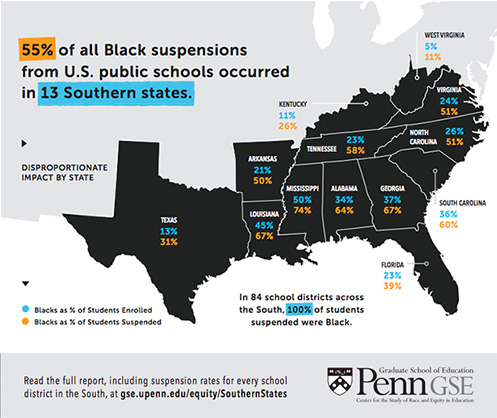Penn GSE report offers district-by-district look at how Black students are disciplined at highest rates in Southern schools
Kat Stein, Exec. Director of Communications Jeff Frantz, Associate Director
katstein@gse.upenn.edu / (215) 898-9642 frantzj@gse.upenn.edu / (215) 898-3269
*Note for TV and radio: The University of Pennsylvania has an on-campus ISDN line and ready access to a satellite uplink facility with live-shot capability.

In schools across the United States, Black students are punished more severely than their peers. But nowhere are Black students suspended or expelled more than in the South. Fifty-five percent of the 1.2 million Black students suspended in the U.S. live in just 13 Southern states.
In a new report, the Center for the Study of Race and Equity in Education at the University of Pennsylvania Graduate School of Education offers a state-by-state, school district-by-district examination of school discipline for Black students in the South.
Researchers Edward Smith and Shaun Harper found Black students were consistently suspended and expelled at higher rates than their peers across the region. This held true in urban, suburban, and rural districts, for both Black boys and Black girls. The study is an analysis of every public school district in the South, over 3,000.
“The findings in our report point to the residual effects of Jim Crow, slavery, and unequal schooling,” Harper said. “They are further explained by poverty trends, structural inequities in the education workforce, and a longstanding history of racial injustice that cyclically reproduces itself, especially across these 13 Southern states.”
Read the FULL REPORT*, which lists the districts in each state that discipline Black students at the most disproportionate rates.
VIEW VIDEO of Harper & Smith: https://vimeo.com/penngse/southernstates
Among the findings:
- In Alabama, 34 percent of the students are Black, but Black students account for 64 percent of suspensions and 58 percent of expulsions.
- In Arkansas, 21 percent of the students are Black, but Black students account for 50 percent of suspensions and 33 percent of expulsions.
- In Florida, 23 percent of students are Black, but Black students account for 39 percent of suspensions and 28 percent of expulsions.
- In Georgia, 37 percent of the students are Black, but Black students account for 67 percent of suspensions and 64 percent of expulsions.
- In Kentucky, 11 percent of the students are Black, but Black students account for 26 percent of suspensions and 13 percent of expulsions.
- In Louisiana, 45 percent of the students are Black, but Black students account for 67 percent of suspensions and 72 percent of expulsions.
- In Mississippi, 50 percent of the students are Black, but Black students account for 74 percent of suspensions and 72 percent of expulsions.
- In North Carolina, 26 percent of the students are Black, but Black students account for 51 percent of suspensions and 38 percent of expulsions.
- In South Carolina, 36 percent of the students are Black, but Black students account for 60 percent of suspensions and 62 percent of expulsions.
- In Tennessee, 23 percent of the students are Black, but Black students account for 58 percent of suspensions and 71 percent of expulsions.
- In Texas, 13 percent of the students are Black, but Black students account for 31 percent of suspensions and 23 percent of expulsions.
- In Virginia, 24 percent of the students are Black, but Black students account for 51 percent of suspensions and 41 percent of expulsions.
- In West Virginia, 5 percent of the students are Black, but Black students account for 11 percent of suspensions and 8 percent of expulsions.
- In 181 school districts in these states, 100 percent of the expelled students were Black. In 84 districts, 100 percent of the suspended students were Black.
Suspensions and expulsions can carry life-changing consequences for children. They impact academic performance and disrupt pathways to college, but also how a school and community perceive a student.
“It could take years to process through the trauma and stigma of being deemed a problem—that you’re not responsible, not serious,” Smith said. “Teachers and district leaders are signaling that you’re not worthy enough for us to invest in.”
The researchers’ recommendations for improving equity in school discipline include:
- Black families, religious congregations, and others concerned about racial justice must hold schools accountable and partner with educators to identify alternatives to policies and practices that sustain the school-to-prison pipeline.
- Zero tolerance discipline policies do not make schools safer. School leaders need to eliminate them, offer more professional development for educators on managing student behaviors, and lead district-wide conversations about racial equity.
- Teaching more about implicit bias and other racist forces that lead to dis- proportionality in school discipline must occur in schools of education, as well as other sites where teachers are prepared and educational leaders are certified.
Harper, Executive Director for the Center and a Penn GSE professor, hopes the report is a call to action.
“We want to raise consciousness and ignite important conversations among parents and families, community leaders and activists, clergy and religious leaders, and educators about what we can do to make sure Black students aren’t continually affected by racist school policies and practices,” Harper said.
*Update: This report is now housed with the USC Rossier School of Education. The link has been updated to reflect the move.
_________________________________________________________________________________________________
About the Graduate School of Education (GSE) at the University of Pennsylvania
Penn GSE is one of the nation’s premier research education schools. No other education school enjoys a university environment as supportive of practical knowledge building as the Ivy League’s University of Pennsylvania. The School is notably entrepreneurial, launching innovative degree programs for practicing professionals, unique partnerships with local educators, and the first-ever business plan competition devoted exclusively to educational products and programs. For further information about Penn GSE, please visit www.gse.upenn.edu.
